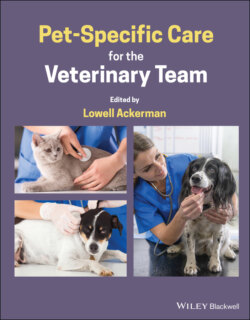Читать книгу Pet-Specific Care for the Veterinary Team - Группа авторов - Страница 319
3.9.5 Mixed‐Breeds
ОглавлениеMixed‐breed pets have always posed a problem to disease risk prediction, since without knowing breeds, it can be difficult to predict breed predisposition to disease (see 3.19 Mixed‐Breed Considerations). This has been partially offset today by the ability to determine likely breed contributions on the basis of genetic testing. Such genetic testing will often not determine ancestry with absolute precision, but perhaps with sufficient accuracy to allow veterinary teams to consider some disease predisposition in individuals. Genetic testing can also be used for disease screening of certain entities, and may even predict a variety of traits, such as the pet's likely size as an adult.
Since medical records are also legal documents, if a mixed‐breed animal is presented, it is best to identify it as a mixed‐breed in the breed field within practice management software. Identifying pets as crosses based on their appearance (e.g., shepherd x, Himalayan x) is fraught with inaccuracies and likely gets things wrong as often as gets them right. Since the breed identified in a medical record can be a clue to disease predisposition, it is better not to try to “guess” what the contributing breeds might be and instead either use a generic term like mixed‐breed or use genetic testing to get a better approximation, if desired. The only time more specific speculation is warranted is if the parents of the mixed‐breed animal are known with certainty (e.g., neighbor's dog jumped the fence and impregnated pet owner's intact bitch).
While purebreds and hybrids tend to have higher relative risk for certain genetic disorders (especially traits attributable to single‐gene mutations), it is important to realize that mixed‐breed animals may still constitute a significant proportion of health concerns in a practice (e.g., diabetes mellitus, osteoarthritis, obesity, etc.).
There is a tendency to recommend mixed‐breed pets to prospective owners based on the fact that there are many more of these available in shelters that need homes, and this is a very real benefit, but it is also important to realize that there are many reasons why some prefer to bring purebreds and hybrids into their homes.
